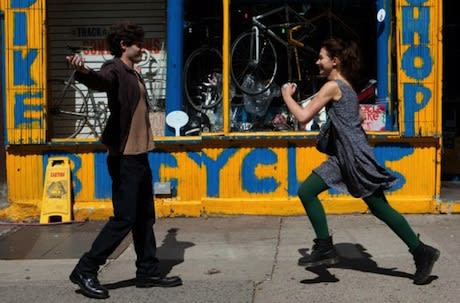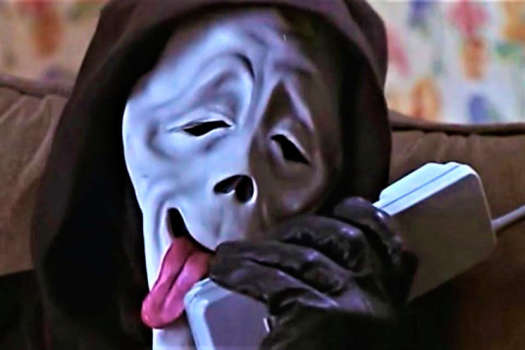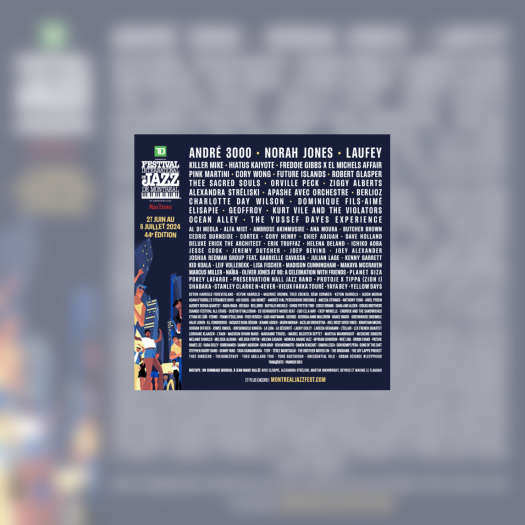Early in Daniel Algrant's conciliatory, deliberately earnest look at the days leading up to the 1991 tribute concert for Tim Buckley (Ben Rosenfield) at St. Ann's Church, his son, Jeff (Penn Badgley), is coerced into travelling from Los Angeles to Brooklyn to add a bit of publicity flare.
Throwing him right into the jam session atmosphere after a bit of obligatory, thinly veiled ass-kissing, the musicians start mocking L.A., noting its superficiality and their inability to get laid there. While critical of the locale and its insincerity, none of the artists — all upholstered in functionally redundant hats and manic hairstyles — demonstrate any self-awareness about their similar, albeit more faux-organic and "issue"-driven, identity performance.
In a way, this is also the main problem with Dan Algrant's Greetings from Tim Buckley; its transparent attempts at humble minimalism, eschewing the traditional biopic format for a structurally loose slice of life, tries too hard to present a non-existent thematic depth and indifferent hipness.
Pre-Grace Jeff Buckley is a bit of a mopey, petulant sad sack, whining about his paternal frustrations to Allie (Imogen Poots), a fictional conceit written as a bit of an emo-artiste cliché — a fun-loving girl with a complicated soul that does little more than act as an overly empathic-sounding board for forced introspection and thematic extrapolation.
This flimsy love story carries almost as much narrative weight as the central conflict, which, as presented is a tenuous, surprisingly superficial disconnect between Jeff and Tim, utilizing flashbacks with his troubadour daddy, abandoning a pregnant girlfriend to tour around. Jeff, when not doing his improvisational, lyric-free wails in a record store to show everyone his range, is defined mostly by this sense of abandonment and worldly isolation, projecting feelings onto the comely cipher in front of him merely because she gives a shit.
What's unfortunate is that these separate narrative strands — 1991 as present-day and 1966, prior to Tim's overdose — exist next to each other without actually saying anything about each other. They're tied together by visual cues and graphic matches, so there's some sense of flow, but they're never utilized to heighten either storyline. They merely exist to communicate a broad sense of disconnect between father and son, one that is inadvertently exacerbated by sloppy, pretentious storytelling.
And because this cheap indie love story and shallow presentation of a sulky, guitar-playing icon do little to build up any tension, the eventual recreation of the tribute concert — the highlight of the film — doesn't have the intensity intended.
Jeff comes out on stage and sings one of his father's songs, which Badgley sells quite effectively, demonstrating the talent that would eventually spell brief success a few years later. But since it wasn't given any effective context, it's mostly a hollow spectacle.
(Tribeca Film)Throwing him right into the jam session atmosphere after a bit of obligatory, thinly veiled ass-kissing, the musicians start mocking L.A., noting its superficiality and their inability to get laid there. While critical of the locale and its insincerity, none of the artists — all upholstered in functionally redundant hats and manic hairstyles — demonstrate any self-awareness about their similar, albeit more faux-organic and "issue"-driven, identity performance.
In a way, this is also the main problem with Dan Algrant's Greetings from Tim Buckley; its transparent attempts at humble minimalism, eschewing the traditional biopic format for a structurally loose slice of life, tries too hard to present a non-existent thematic depth and indifferent hipness.
Pre-Grace Jeff Buckley is a bit of a mopey, petulant sad sack, whining about his paternal frustrations to Allie (Imogen Poots), a fictional conceit written as a bit of an emo-artiste cliché — a fun-loving girl with a complicated soul that does little more than act as an overly empathic-sounding board for forced introspection and thematic extrapolation.
This flimsy love story carries almost as much narrative weight as the central conflict, which, as presented is a tenuous, surprisingly superficial disconnect between Jeff and Tim, utilizing flashbacks with his troubadour daddy, abandoning a pregnant girlfriend to tour around. Jeff, when not doing his improvisational, lyric-free wails in a record store to show everyone his range, is defined mostly by this sense of abandonment and worldly isolation, projecting feelings onto the comely cipher in front of him merely because she gives a shit.
What's unfortunate is that these separate narrative strands — 1991 as present-day and 1966, prior to Tim's overdose — exist next to each other without actually saying anything about each other. They're tied together by visual cues and graphic matches, so there's some sense of flow, but they're never utilized to heighten either storyline. They merely exist to communicate a broad sense of disconnect between father and son, one that is inadvertently exacerbated by sloppy, pretentious storytelling.
And because this cheap indie love story and shallow presentation of a sulky, guitar-playing icon do little to build up any tension, the eventual recreation of the tribute concert — the highlight of the film — doesn't have the intensity intended.
Jeff comes out on stage and sings one of his father's songs, which Badgley sells quite effectively, demonstrating the talent that would eventually spell brief success a few years later. But since it wasn't given any effective context, it's mostly a hollow spectacle.




